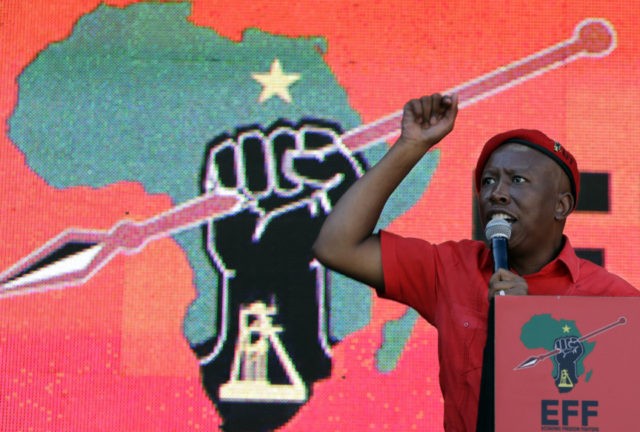South Africa’s hotly contested election began with a literal blaze, as six especially fiery voters set an election official’s car on fire in Ganyesa on Monday.
Six people were arrested for burning the car, while someone else burned a ballot box in the town of Ikageng and miscellaneous other “disruptions” were reported. A few precincts were unable to hold votes as scheduled due to “community unrest.”
Some of these shenanigans seem to be unfocused expressions of frustration by people who have lost confidence in the entire South African political system, rather than targeted efforts to suppress a particular candidate’s vote.
The BBC found voters lethargic and fatalistically resigned to another term for President Cyril Ramaphosa and his dominant African National Congress (ANC) party, even though the ANC is widely seen as corrupt and incompetent:
The unemployment rate is 27.1%, one of the world’s highest, with more than six million people out of work, from a population of 58 million.
Both the opposition parties – Economic Freedom Fighters (EFF), who advocate radical transformation of the economy to benefit the black majority, and the centrist Democratic Alliance – believe they will gain support amid public disillusionment at ANC misrule.
A look at the president’s welcoming committee gave an insight into the crisis prompting this decline.
The local mayor, Zandile Gumede, who was dancing to a party anthem with some clerics when we arrived, has been forced to publicly deny allegations of corruption.
Newspapers are reporting that the Hawks – the police anti-corruption unit – are preparing her arrest. Local authority workers in the nearby city of Durban are in open revolt against Mrs Gumede’s administration and rubbish is piling up in the streets.
The ANC is, of course, promising to crack down on corruption and asking for a mandate from voters to make it possible. The ANC has enjoyed a seemingly unbreakable lock on power for 25 years, so alternative candidates have trouble convincing voters they would have the political muscle to implement dramatic reforms even if they won the election.
The website African Arguments interviewed a voter named Asanda Qosha who has not been “officially employed” since 2011 and essentially works under the table as a contractor to make ends meet. He neatly summed up the fatalistic state of South African politics, saying, “The ANC is the only vehicle for people to get out of poverty … The ANC is very corrupt. It really bothers me. They are robbing our poor – that’s why there’s no housing, roads, or clinics.”
As for the opposition parties, Qosha dismissed the Democratic Alliance (DA) as obsessed with the “suburbs,” by which he meant whites, and unwilling to “speak out when whites are involved with corruption.” He saw the radical Economic Freedom Fighters (EFF) as collectivist maniacs who would “scare off investors with their demands for land nationalization.”
The ANC seems to have little support in rural South Africa, the extravagant corruption of former President Jacob Zuma having thoroughly tarnished bright memories of the Nelson Mandela era. But as Asanda Qosha indicated, divided rural voters have difficulty trusting any of the alternative parties. The ANC is expected to remain the majority party, but it might dip under 50 percent, or it might do roughly as well as it did in 2014 when it took 62 percent of the vote.
Voting on Monday and Tuesday was reserved for “special voters” who applied for an early ballot in advance because they are elderly, infirm, or planning to be out of the country during the general election. The general election will be held on Wednesday.
A dismaying number of South Africans asked Google who to vote for. Based on Google’s data, there appears to be a good deal of either anticipation or apprehension around EFF candidate Julius Malema, whose name was searched for more often than Ramaphosa or DA candidate Mmusi Maimane.
Malema spent Tuesday warning white voters they can expect to see their wealth seized and redistributed if the EFF wins, and the party will not necessarily be polite about it.
“White people, all we want is to join you at the dinner table and eat with you. If you do not want us to sit with you at the table, then we have no choice but to destroy the table. No one is going to eat,” he said.
When Malema and the EFF were sued for defamation over public accusations of corruption against South African ministers, Malema cheerfully admitted his organization’s fiery populist language is “open to criticism as being heavy-handed, inelegant, unfair, overly critical, or even insulting.” One of his inelegant tactics involved posting contact information online for a journalist who wound up dealing with rape threats, potentially violating South African election laws.
The Mail&Guardian sized up all three of the top parties on Tuesday and concluded that the EFF will probably see a dramatic increase in its small share of the vote, but the DA has a better chance of winning over disaffected ANC voters.
Ramaphosa’s home-stretch strategy appears to be admitting past mistakes, begging for a second chance, invoking the emotional connection many South Africans feel with the ANC, and firewalling much of the corruption to the Jacob Zuma wing of the party, which Ramaphosa is promising to clean out.

COMMENTS
Please let us know if you're having issues with commenting.